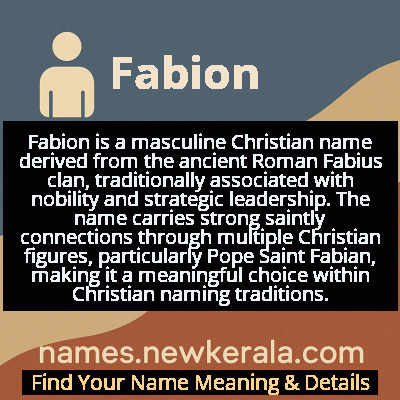Fabion Name Meaning & Details
Origin, Popularity, Numerology Analysis & Name Meaning of Fabion
Discover the origin, meaning, and cultural significance of the name FABION. Delve into its historical roots and explore the lasting impact it has had on communities and traditions.
Name
Fabion
Gender
Male
Origin
Christian
Lucky Number
2
Meaning of the Name - Fabion
Fabion is a masculine Christian name derived from the ancient Roman Fabius clan, traditionally associated with nobility and strategic leadership. The name carries strong saintly connections through multiple Christian figures, particularly Pope Saint Fabian, making it a meaningful choice within Christian naming traditions.
Fabion - Complete Numerology Analysis
Your Numerology Number
Based on Pythagorean Numerology System
Ruling Planet
Moon
Positive Nature
Diplomatic, friendly, artistic, empathetic.
Negative Traits
Over-sensitive, moody, indecisive, prone to self-pity.
Lucky Colours
Green, cream, white.
Lucky Days
Monday.
Lucky Stones
Pearl, moonstone.
Harmony Numbers
1, 3, 4.
Best Suited Professions
Diplomats, mediators, caregivers, artists.
What People Like About You
Cooperative spirit, friendliness, artistic talent.
Famous People Named Fabion
Saint Fabian
Pope and Martyr
Organized early Church administration and martyred for faith
Fabius Maximus
Roman General
Developed successful attrition strategy against Hannibal
Fabian Gottlieb von Bellingshausen
Explorer
Discovered Antarctica for Russia in 1820
Fabian Cancellara
Cyclist
Multiple world champion and Olympic gold medalist
Name Variations & International Equivalents
Click on blue names to explore their detailed meanings. Gray names with will be available soon.
Cultural & Historical Significance
In Christian culture, the name gained spiritual importance through Pope Saint Fabian, who led the early Church during a period of significant growth and persecution. His miraculous election story, where a dove descended upon him, and his subsequent martyrdom made him a revered figure in Christian hagiography. The presence of at least 16 saints bearing variations of this name across different Christian traditions has cemented its place in religious naming practices. This dual heritage—Roman nobility and Christian sanctity—makes Fabion a name that bridges classical civilization and spiritual devotion, representing both worldly wisdom and heavenly calling.
Extended Personality Analysis
Individuals named Fabion typically exhibit a thoughtful, strategic approach to life, reflecting the legacy of their namesake's military genius. They are often patient planners who prefer methodical progress over hasty decisions, carefully considering all angles before committing to action. This analytical nature makes them excellent problem-solvers and reliable advisors. While they may appear reserved initially, they possess deep convictions and remarkable persistence when pursuing their goals. Their calm demeanor often masks a strong will and determined spirit that emerges when facing challenges.
Fabions tend to be natural leaders who inspire confidence through their competence rather than charisma. They value tradition and stability while being adaptable enough to navigate changing circumstances. The Christian associations of the name often manifest as strong moral principles, service-oriented attitudes, and community involvement. They typically demonstrate loyalty in relationships and take their responsibilities seriously. Their combination of practical wisdom, organizational skills, and ethical grounding makes them respected figures in both professional and personal spheres, often serving as pillars of strength for those around them.
Modern Usage & Popularity
In contemporary naming practices, Fabion maintains a distinctive presence as a rare but meaningful choice, particularly among families with Christian or classical interests. The name sees modest usage across English-speaking countries, often preferred by parents seeking a name with historical depth that avoids current trends. While the similar name Fabian has gained more widespread acceptance, Fabion retains a unique character that appeals to those wanting something less common. The name enjoys stronger popularity in European nations like Germany, Poland, and Scandinavian countries where saint names and classical references remain fashionable. Recent naming trends show Fabion being chosen by educated, middle-class families who value both the name's Roman heritage and its Christian significance. Its rarity in modern times adds to its appeal for parents seeking a distinctive name with substantial cultural and historical weight.
Symbolic & Spiritual Meanings
Symbolically, Fabion represents the power of strategic patience and enduring legacy. Drawing from its Roman roots, it embodies the wisdom of measured response and tactical thinking—the ability to achieve victory through persistence rather than brute force. The name's connection to bean cultivation in its etymology symbolizes growth through careful nurturing and the value of sustainable development. In Christian symbolism, it represents divine selection and faithful endurance, recalling both the miraculous election of Pope Fabian and the steadfastness of martyrs. The name also carries connotations of nobility, tradition, and service, suggesting someone who bridges ancient wisdom with contemporary application. It symbolizes the integration of military strategy with spiritual warfare, of political acumen with moral integrity, making it a name that represents balanced leadership and timeless values.

